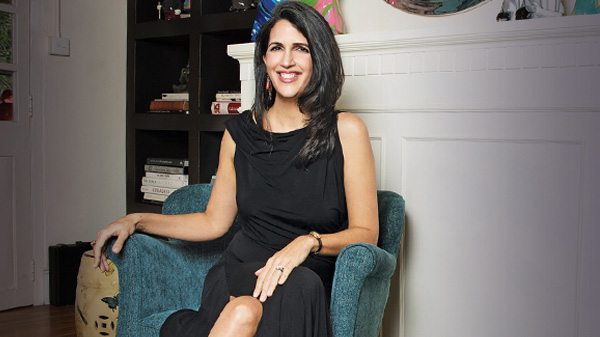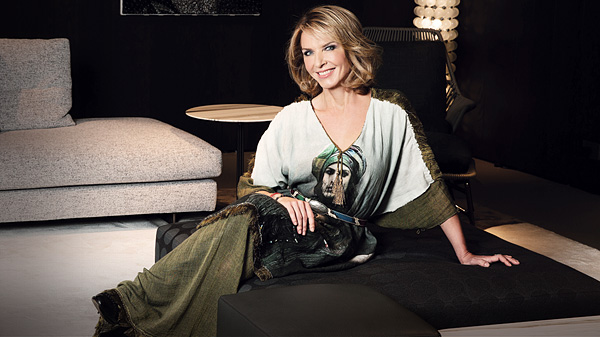As a ballerina, actress, choreographer, TV director and fashion designer, Flora Cheong-Leen has been a trendsetter all her life. We sat down with her in the plush showroom of the COLOURLIVING concept store to talk about her lifelong passion for dance, her brief tryst with acting, her controversial fashion designing career, and above all, her eternal zest for life.

You were just nine when you signed up to London’s Royal Ballet School. What made you so sure that dance would be such a huge part of your life when you were so young?
It was really all down to my sister. She had already enrolled to study under Jean Wong, the illustrious Hong Kong-born ballet dancer who taught at the city’s Royal Academy of Dance. After being under her tutelage for a little while in Hong Kong, she suggested I audition in London. So, when I was just eight or nine years old, I found myself – along with thousands of other kids – trying out for a place at London’s Royal Ballet School. Fortunately, I was first Chinese kid to get accepted and I’ve never looked back. Initially, I was a little homesick and found the training regime to be quite demanding. As my skills improved, however, my love of ballet continued to blossom.
What ultimately led you back to Hong Kong?
Well, I had just been accepted as a professional dancer at the Royal Ballet Company in London when my mum fell ill. So I immediately gave all that up to come back to Hong Kong to be with her. Sadly, six months later, she passed away and I couldn’t bring myself to go back to London. I decided to join the Hong Kong Ballet instead. While it was a smaller company than the one I had been a member of in London, it allowed me to stay close to my family and that was my true priority.

Your return to Hong Kong also marked your transformation into a movie star…
That came about completely by accident. When I first came back to Hong Kong, I picked up some part-time modelling work. It was during one such assignment that someone singled me out and asked if I’d be interested in starring in an upcoming movie. At the time, they were looking for a replacement for Josephine Siao – then one of Hong Kong’s biggest stars – who was pregnant. Of course, I signed up for that. Then the offers started flooding in. Before I knew it, I had committed to 10 different movies.
You eventually gave all that up though…
Well, while I felt I could really express myself emotionally through dance, I didn’t find that same freedom in the movies. The parts I was being offered just didn’t have that kind of depth – all I had to do was look pretty, and that didn’t really resonate with me. I was also not that enamoured with all the add-ons – the promotions, the ribbon-cuttings and the whole PR process.

You also found time to become a fashion designer…
Ever since I can remember, I have loved experimenting with fabrics. As a kid, I would cut the lace trims off my dresses to create new outfits. Let’s just say that my mother wasn’t always impressed. When I was older, I took over my sister’s fashion design business and looked to expand it. It wasn’t long before I launched my first collection – Pavlova. With its name a nod to Anna Pavlova, the legendary Russian ballerina, it had an unabashedly romantic-countryside feel to it.
As the business expanded, it no longer made financial sense to manufacture in Hong Kong, so we outsourced it to the mainland. It was around this time that I also fell under the spell of Chinese culture and art, eventually going on to study for a diploma in art history in Beijing. I felt more connected to my Chinese roots than ever before, something that started to manifest itself in my choice of fabrics and my designs. My collections became quite popular and I went on to open 200 stores under the Tian Art label.
Some of your designs, however, seemed to almost woo controversy…
Yes – after I had an image of the Madonna holding the Baby Jesus in one of my jeans collections, I was accused of trying to promote Christianity in China. That wasn’t the case at all, though, and it was actually more about my take on motherhood. Then I used Chairman Mao badges and motifs as part of another range and that landed me in even more trouble. For my part, though, it was never my intention to be wilfully controversial; I was just looking to be creative.

How would you describe your design ethos?
I have a very multicultural background. My family has ties to South America, China, Australia and Indonesia. As a result, I am inspired by the local cultures of all these places – many of my designs, for instance, feature traditionally Indonesian batik prints. I have also designed a number of contemporary-looking cheongsams to celebrate my Chinese heritage. I am, essentially, pluralistic by nature.
What are the challenges of spending your life in the limelight?
I don’t like my personal life being written about. People would see me with someone at some event or another and then something scurrilous and unfounded would appear in the news the next day. It’s the kind of thing that has made me determined not to remain public property. Life is not about the next party or the next gala; there is so much more to it. I would rather be spending my life doing things that allow me to make a real difference.
Thank you.
Interview: Suchetana Mukhopadhyay
Photos: Jack Law
Video: Kingsley Lau
Art Direction: San Wong
Make-up and Hair: Irene Hung
Jewellery:Cartier
Venue: COLOURLIVING














